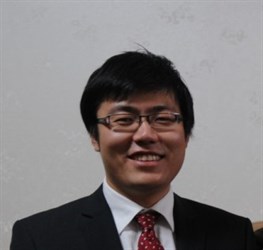Apr 18 2014
In-situ nanoindentation study of phase transformation in magnetic shape memory alloys
 Mr. Yue Liu
Mr. Yue Liu
Texas A&M University researchers led by Dr. Xinghang Zhang in the Department of Mechanical Engineering have examined stress induced martensitic phase transformations in magnetic shape memory alloys via in-situ nanoindentation technique.
The paper titled "Two Types of Martensitic Phase Transformations in Magnetic Shape Memory Alloys by in-situ Nanoindentation Studies" was published in the March 31 issue (2014) of Advanced Materials. The first author of the paper is Mr. Yue Liu, a Ph.D. candidate in Dr. Zhang's research group.
Ni based magnetic shape memory alloys (MSMAs) have broad applications for actuators and microelectromechanical systems (MEMS) devices. Two-stage stress induced martensitic phase transformation, a widely observed phenomenon in these alloys, is described conventionally as a first stage L21 (austenite)-to-10M/14M (M: modulated martensite) transition, followed by a second stage 14M-to-L10 (tetragonal martensite) transformation at higher stresses.
During their in-situ nanoindentation experiments on Ni54Fe19Ga27 in a transmission electron microscope, Zhang and his graduate student, Mr. Yue Liu, discovered two distinctive types of martensitic phase transformation: A reversible gradual L21-to-10M/14M phase transformation at low stress, and an irreversible abrupt transition from residual L21-to-L10 martensite at higher stress. This study provides new perspectives on understanding stress induced phase transformations in MSMAs.
The co-authors of this paper include Dr. Ibrahim Karaman in the Department of Materials Science and Engineering and Dr. Haiyan Wang in the Department of Electrical Engineering at Texas A&M University. This research in Zhang’s group is supported by the National Science Foundation (NSF), the Civil, Mechanical and Manufacturing Innovation (CMMI) Division, under grant no. 1129065.
Zhang is an Associate Professor in the Department of Mechanical Engineering at Texas A&M. His research group expertise is nanomechanics in nanostructured metallic materials, nanotwinned metals, and magnetic shape memory alloys. Here is a link to his Research website: http://nanometal.tamu.edu
Mr. Yue Liu received his B.S. in Electrical Engineering at Fudan University in China, and M.S. in Mechanical Engineering at Texas A&M University. He is expected to complete his Ph.D. in May 2014.